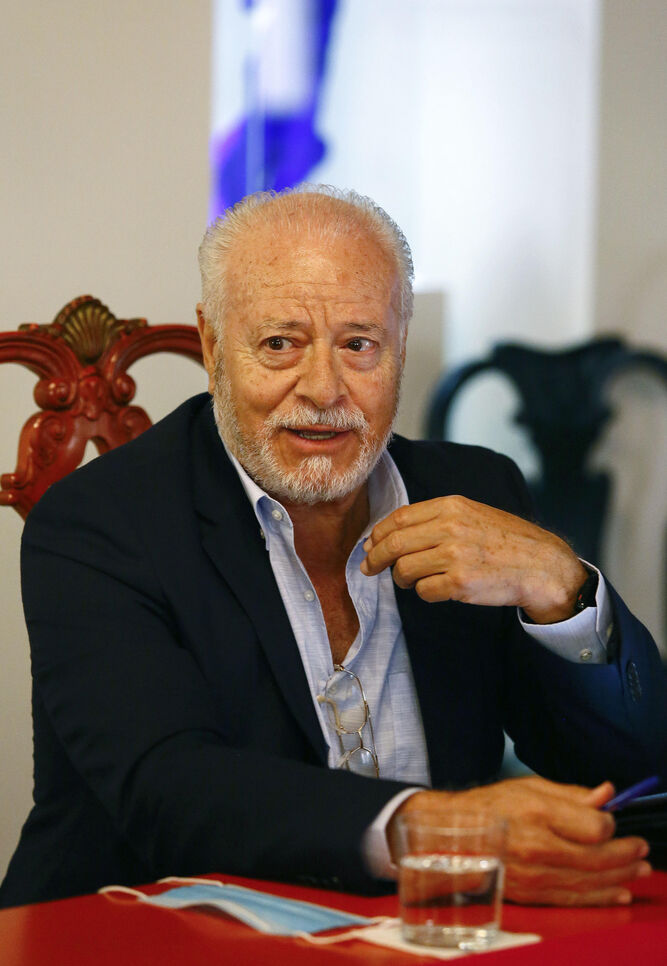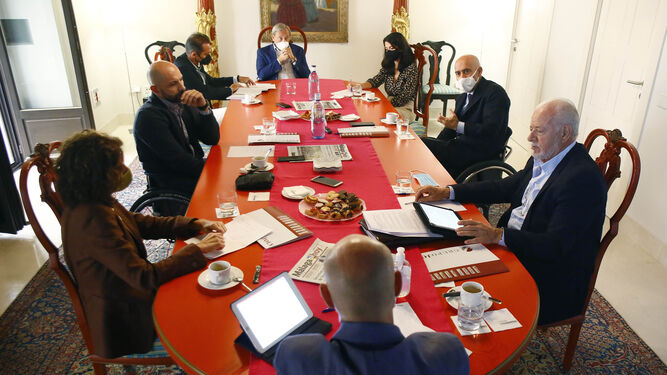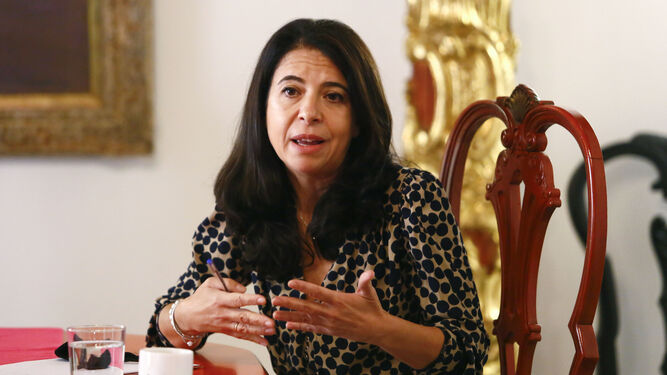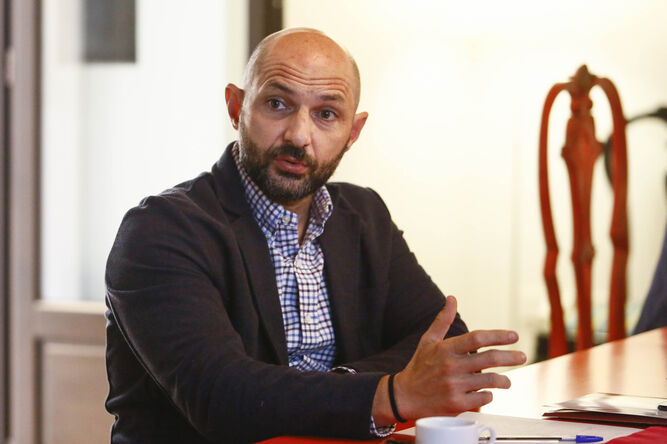League of Agencies: are you IN?
21 mins de lectura
29 October, 2020
High-quality housing, a new window of opportunity for Málaga
21 mins de lectura
29 October, 2020
- The progress being made by the real estate sector in Málaga remains on course despite the pandemic and medium-term forecasts are optimistic
- The commitment to quality architecture is currently one of the distinguishing features of the Costa del Sol’s capital city
Málaga’s consolidation as the destination of choice for Spanish and international investors is obvious. The changes forced by the pandemic are making themselves felt, particularly in the way in which the purchasing process and the selection of the living space is being approached. Málaga Hoy has brought several of the main players of the real estate sector together around the same table to analyse the current situation and, even, to look beyond it. A breakfast sponsored by Metrovacesa and Sierra Blanca, the driving force behind Málaga Tower, one of the major projects being implemented in the capital of the Costa del Sol.
–Málaga Hoy (M. H.): Before analysing the future, let’s talk about the present. In what situation does the sector find itself in considering the uncertainty being caused by the pandemic?
–Violeta Aragón (V. A.), General Secretary of the ABD:
–Málaga is a rough diamond. Or rather, it already glitters both outside and in and is the centre of attraction for new projects. The developments being undertaken have been based on a structured form of town planning for some time now. The city is an example of organised development and is being copied by other municipalities. In particular, what’s the state of play in the property development sector? Housing continues to be an essential asset, and it is still the aim of every citizen to own a home, and Málaga is firmly in the sights of many people who want to come and live somewhere special. The truth is that development is currently being affected by the situation, because there are problems of mobility for people coming here from abroad, and this is bound to have an influence in a province in which 40% of homes are sold to foreigners. Of course, the purchase-sale process is being affected, but we’re very optimistic that this is something circumstantial, that we’ll come through this and that we shall return to being the same centre of attraction as before. It’s true that the primary residence is continuing sell well and we are receiving enquiries regarding second homes.

Jorge Pérez de Leza, CEO of Metrovacesa. / Málaga hoy
–Jorge Pérez de Leza (J. P. L.), CEO of Metrovacesa:
“Up to two years ago the investment funds wanted Madrid and Barcelona. They are now realising that in Málaga there are markets that are both very strong and highly exploitable.”
–What we’re experiencing is a period of transition we thought would last three months, then six and in the end will go on for a year or a year and a half. The strange thing is that residential properties are selling and selling well. If you take Spain’s five largest developers, we are all selling over 10% more than last year. Although it is true that the pre-Covid objectives set for this financial year were higher, the fact that we find ourselves 10% above the level of sales for 2019 is positive and clearly shows that this crisis is very different to that of six, seven or eight years ago. For several reasons. The first, because it is not a question of financing; the current interest rates for buying may be 1% at a fixed rate for 30 years, and that’s unbeatable; there’s going to be unemployment, but of a more temporary nature. Homes continue to sell. It’s true that buyers currently think things through more, that they are taking longer to reach a decision. And that it is harder for the developer to secure financing. Previously the banks were asking us for 30% to finance a development and now it is 40%, and in the case of second homes this rises to 50% and, in some cases, they turn us down. And that can extend the deadlines with respect to commencing a project. As far as the type of product is concerned, there is a significant upturn in single-family homes and a move to the suburbs. We’ve noticed a change in the sense of more people opting for the suburbs and going for a larger home at the same price. In the more inner-city projects, there is a preference for properties with a terrace and balcony. Real estate is a sector that is functioning, and in our case with 12%-13% more sales than last year. It’s true that on the coast, with the second home, there is a limitation as regards the mobility of foreign clients. But the number of opportunities we are receiving via our website is higher than last year. This indicates that the standard buyer we have in our province, who comes from northern Europe, is more interested in coming here. And probably with the idea that in the future he or she might want to work from home and that there could be another lockdown just around the corner. And the city of Málaga, with the communications and infrastructures it offers, has climbed to the top of the European ranking. Given the situation in which we find ourselves, we are satisfied. Other segments in the world of Real Estate investment must also be highlighted, and one of these is that there is more funding than ever. With a 0, or even a negative, rate of interest, investment in Real Estate offers higher returns, which makes it an extremely attractive proposition with the result being more investors looking out for opportunities. We are seeing a lot of activity in student halls of residence, rental residential properties, care homes for the elderly and office buildings, although the latter is somewhat less buoyant. It must be remembered that up until two years ago the investment funds only had eyes for Madrid and Barcelona. Now this has changed, and in the last two years the investor coming from London or the United States has turned his sights on other cities and has realised that in Málaga there are markets that are both very strong and highly exploitable. There is a great deal of potential.

Pedro Rodríguez, Chairman of Sierra Blanca. / Málaga hoy
–Pedro Rodríguez (P. R.), Chairman of Sierra Blanca:
–The first months of the pandemic have hit the sector hard and interest has been restored by way of virtual visits. It is quality properties that are selling and generating extraordinary interest. It’s true that there is less mobility and that in some cases there is none. When domestic and international flights are reinstated and the situation returns to a modicum of normality, we are very optimistic about the sector in Málaga and the Costa del Sol. We here in Málaga believed that 70 or 75% of investors were going to be foreigners or residents of other parts of Spain, but faced with the impossibility of visiting, that source of demand has fallen back somewhat. However, we remain optimistic.
–M. H.: In the case of the city of Málaga itself, the information being disseminated by the Town Planning Management Department rules out talk of a standstill.
–Raúl López (R. L.), Councillor for Land Use Planning:
“We are not only constantly receiving enquiries about residential properties, but also about logistics sites. This will be the main driving force behind the sector over the next few years”.
–There will be no standstill, of that I’m certain. Many of the investors who visit us are saying that we are now number one in Spain’s second tier investment ranking. Being first in line behind Madrid and Barcelona is something special. When the majority of investors request the services of our Department they do so with a preconceived idea while at the same time keeping an open mind as to what the city can offer them. It is our intention to make our urban facilities conducive to coliving. Perhaps as a result of the pandemic what investors are looking for is a more suburban single-family detached housing market, while in the city itself it is the rental market that is becoming more consolidated. We are not only constantly receiving enquiries about residential properties, but also about logistics sites. This will be the main driving force behind the sector over the next few years. We have almost 9 million square metres of logistical sites and a window of opportunity is being developed for many investors. With respect to the processing of permits, everything planned is being implemented, meaning that there has been no standstill, but we are seeing that many ongoing projects are being phased. It is premature to talk about where we’re going to be next year, and there is a certain degree of trepidation when it comes to taking a number of projects forward, but there is also a window of opportunity for those investors who, without having a definitive project, want to commit to an investment in the city with an ROI period of no longer than five to eight years. We are generating a great deal of interest among investors not only in housing, but also in other land uses. There has been no slowdown in the hotel sector. At first it seemed that some developments might be shut down, but that never happened. We are closing in on a number of agreements for submitting several hotel developments for public auction.
–Leonor Muñoz (L. M.), Chairwoman of the Professional Association of Technical Architects:
–I have here the hard numbers our association has regarding the sector’s performance this year. The forecast is that, as far as the city of Málaga is concerned, this year will end with 9% more dwellings started than last year. And with respect to the province as a whole, we are predicting a downturn. All of us involved with the sector are closely monitoring the data, because all of us clearly remember the fright the 2008 economic downturn gave us. However, we must recognise that the current situation is different. Our sector has continued to operate, we have been vital to the country, and it has to be stressed that we are seeing an upturn in construction. The sector’s economy is in rude health, there is a lot of work, and it’s difficult to find enough workers. We are all extremely wary as to how things are going to continue, but what is true is that the clients are still showing a spirit of investment. A lot is being said about investments, but the importance to the local economy of the fact that the sector is still active must be highlighted.
–M. H.: Bearing in mind Jorge Pérez de Leza’s point regarding the prolongation of the pandemic, is there a fear that many companies might fall by the wayside?
–V. A.: It’s important to insist that the current crisis is different to that of 2008. That one was financial, whereas now the developers have no problems continuing. There will be an end to this crisis, and we all know that when the long-awaited vaccine is available, we shall return to normality. Property development timescales are long-term, meaning that any investor has to commence development projects now if he or she wants to be well placed in two years’ time. And we are all predicting that in two years this particular crisis will be over. The investors know this.
–J. P. L.: There are two key words: standstill and adaptation. Whenever I see the word “standstill”, I think that whoever used it doesn’t know what they’re talking about. What we have is a logical adaptation of developers who are better funded than before. We have to adapt to the new situation. We are not selling all the potential that we should be, but we are in the middle of a pandemic. In 2008 everything stopped. Now, however, we, the developers, are finishing off the projects we have started, because everything is more carefully designed and being implemented in phases. While in March and April, coinciding with the height of the pandemic, there were hardly any sales (the number of sales fell from 200 units a month to 15), now we are selling again, although it is true that the transactions are taking longer. Likewise, the banks are lending, although they are requiring more pre-sales, and the constructors are in a more solid position that is enabling them to weather the storm. On the other hand, today’s caution is not the same as that of last April because, although the uncertainty is still with us, the situation is different. At Metrovecesa we are fully prepared to adapt our response to the speed of the market, and the fact is that business hasn’t stopped, rather it has adapted to the circumstances.

During the breakfast, Leonor Muñoz, Chairwoman of the Professional Association of Technical Architects; Pedro Rodríguez, Chairman of Sierra Blanca; Raúl López, Councillor for Land Use Planning; Jorge Pérez de Leza, CEO of Metrovacesa; Violeta Aragón, General Secretary of the Association of Builders and Developers (ABD), and Antonio Méndez, Director of Málaga Hoy. / Málaga hoy
–M. H.: Let’s talk about one of the city of Málaga’s current real estate benchmarks, Málaga Tower. How’s the project progressing?
–J. P. L.: What we have is three towers, two of which we are in the process of being sold off-plan. Fifty to sixty percent (50-60%) of our client mix are from overseas, and they are currently unable to come to Spain to see the project. Bearing category and price in mind, it is logical that the sales process is taking longer than usual, given the question of client confidence. Despite this, we have sold more than 30%, the project is fully funded, and the plan is to start construction in the first half of 2021. We are talking about a project which is among the top 5 being implemented by Metrovacesa. It is an attractive project, and we are absolutely convinced that it is the perfect option for this type of clients.
–P. R.: We have sold around 30% of our tower. We think we shall begin building at the beginning of next year. We are convinced that Málaga Tower promotes the image of Málaga because it is a commitment to vertical town planning and showcases the modernity of the city. The project stands out not only for the high quality of its design and materials, but also the quantity and quality of the communal services, which are going to be one of a kind, which is what the domestic and international client is demanding. We believe that Málaga is going to come out of this crisis stronger and in a very different way to other cities or residential centres on the Costa del Sol. Málaga benefits from the same climate and is portraying itself as a fantastic residential destination with great advantages such as the quantity and quality of its cultural centres, communications, etc. Málaga provides everything that a foreign or Spanish resident might be looking for in a second home. And this is already obvious and is becoming increasingly so. Málaga is also committed to the diversification of the city’s activities, given the fact that it cannot, and indeed must not, exclusively depend on holiday tourism and the hospitality sector. It is becoming a nerve centre of new technologies. And it must continue with its commitment to attract the new economy.
PEDRO RODRÍGUEZ, CHAIRMAN OF SIERRA BLANCA: “Málaga is going to come out of this crisis stronger, and it provides everything that a foreign or Spanish resident might be looking for in a second home”
–M. H.: A few months ago, it was being suggested that the western district of Málaga might be transformed into a type of Golden Mile.
–P. R.: I still stand by and remain convinced by this. Málaga Tower is helping to regenerate that area and is setting a trend, because the new projects already being implemented are based on a magnificent design and an extremely high quality.
–M. H.: Raúl, how important is a project of this scale for the city?
–R. L.: One can only feel proud of projects of this type as they trigger a knock-on effect. Málaga is going up and up in the world because the elements that go make it up are increasingly better. They are the flagships of the new development of the city and I believe they are going to be complemented with many other activities. Some of the potential buyers are high-end consumer clients who are looking for more things from the city. And it is our intention to round off the offer with top-quality private universities, we are working towards completing these facilities with a financial centre complex, and we shall be developing tertiary elements for offices. The new society is looking to live and work in the same space. A city that could be Repsol, the Port, Tabacalera, Torre del Río, etc. When we announce that there are six private universities that want to be in Málaga, we are telling the purchasers of the future to buy in Málaga.
–M. H.: It would appear that Málaga is currently an investment benchmark. Is that really so?

Violeta Aragón, General Secretary of the Association of Builders and Developers (ABD). / Málaga hoy
–V. A.: It’s both apparent and can be proved. The major investment funds are already in Málaga. The majority of those operating in Spain are doing so in Madrid and Barcelona, but they’re also here in Málaga, and that’s a fact. Just as Raúl said that a specific project attracts others, the presence of large investment funds makes others turn their attention to the city.
–J. P. L.: Investment funds are looking for three things. Profitability, liquidity, and legal certainty. If I rent a care home for the elderly, I want there to be elderly people to fill it, who pay their monthly rent. That happens when a city grows both demographically and with respect to job opportunities, and this is the case in Málaga. Where liquidity is concerned, it must be considered that the international fund has a limited duration, they must enter markets from which they can disinvest at the proposed time. If this is not the case, they get cold feet. That liquidity is generated with volume and that is what’s happening in Málaga. As regards legal certainty, cases such as that of renting in Catalonia frighten and block the funds. Bring all three of these variables together and it is easy to see why Málaga has risen to the top of investment tier 2 over the past two years. And the fourth variable to be found in this city is that it has a vision. A mayor who attracts both the employer and the business, who is up to speed with what’s happening and who shows a special type of commitment is a rarity, and this makes the investor feel secure as it shows a vision that goes above and beyond the short term.

Leonor Muñoz, Chairwoman of the Professional Association of Technical Architects. / Málaga hoy
–L. M.: In Málaga building is going ahead and is doing so with a great deal of quality in comparison with other municipalities. We have turned it into a friendly city. It is being transformed into one of the major provincial capitals. There’s one aspect we are going to touch upon, and that is the matter of the aid from the European Union. Where is that money going to go? It’s going to go into sustainability, into energy quality, and the outlook for Málaga is extremely good. We also want to try and keep working on improving the existing city.
LEONOR MUÑOZ, CHAIRWOMAN OF THE PROFESSIONAL ASSOCIATION OF TECHNICAL ARCHITECTS OF MÁLAGA: “We are seeing a speed-up of construction. The sector’s economy is in very good shape”
–P. R.: In the real estate sector we have to commit to constructing more and better-quality projects. This is because we have to compete not only with our most immediate milieu, but also with cities and destinations in the most far flung parts of the planet. And where competitiveness is concerned, it is quality that wins the day. Economic and social development is fundamental for the success of a residential development. Málaga is channelling its efforts into diversifying its economy and into those activities that go on to attract the major, most talented researchers, which is the present-day wealth of all great cities. We are not going to be a Silicon Valley, we are not going to be a Wissman Institute, but we must try and establish development and research centres in order to move forward economically and create added value. That’s the future Málaga is working towards.
–M. H.: We have talked about the potential opportunities that Málaga has to offer. But what obstacles might there be that could slow down this development?
–J. P. L.: Three fundamental questions concern us in this regard. Firstly, town planning and the granting of permits, although it must be said that the city of Málaga manages both these aspects well, and that makes the developer feel secure. Secondly, supplies. The supply companies are not customer centric, with the customers being ourselves, the developers, or the end buyer. Finally, as we mentioned previously, the guaranteeing of legal certainty is paramount, such as, for example, regarding the renting of dwellings.
–M. H.: Violeta, the developers have been working for years to achieve the statement of compliance. What’s left to do?
–V. A.: It has been shown to work perfectly, it gives clients the same security and does so faster. We still have to iron out a number of interpretations that generate certain doubts during processing, with this being done at municipal level. And we are working on, for example, on the financial support for young people so that they can afford their own home, be it for rent or for sale, using land owned by the administration or land reserved for public use. We are working alongside the Regional Government on the matter of financial support to buy for young people, because there are now many of them who are able to pay but who have not been capable of making the savings for putting down a deposit. And the legal certainty must be strengthened, and the formalities have to be simplified. Many administrations and many departments of these are involved in every formality and there is no coordination between them. Half the laws that regulate town planning are superfluous. All of this has to be sorted out because if it isn’t we generate uncertainty in the investor that makes us non-competitive with respect to other destinations in our immediate vicinity, such as the south of Portugal. It was there, ten years ago, that incentives were established for second homes for foreigners. This is not being done in Spain.
VIOLETA ARAGÓN, GENERAL SECRETARY OF THE ASSOCIATION OF BUILDERS AND DEVELOPERS (ABD): “We are working on support to buy for young people; many are able to buy but not capable of saving to put down a deposit”.
–R. L.: I believe that Pandora’s box has been opened. With respect to the statement of compliance, measures would be necessary to ensure that the developers are clear about the rules of the game, that there is a code of conduct. As far as homes for young people are concerned, we are on the point of closing a number of agreements with Sepes, with the major Expo 2027 project. The fact that the Government designer is coming to Málaga as a candidate is going to contribute to positioning ourselves more effectively so as to ensure the investors come. We are working on the exchange of land so as to free up almost 1,000 homes for renting to young people. And then there is the request made by the Developers’ Association asking us to include the arrangement for coliving spaces, something with which the Town Planning Department agrees. However, not all the arrangements have to suffice, they can suffice for generating cheap rents, but not in every district and not with the same criterion. How some plots can be earmarked for coliving has to be regulated and is a reasonable way out. And as regards legal certainty, it is a little sad that in the end all of us find ourselves swimming in the wake of the service sectors. I’m talking about Water, Roads, Seaboards, etc. Which one of us here isn’t constantly on the phone? Perhaps the fact that it is not the administration nearest to us clouds the management process and makes it take longer to implement. It is necessary that local town planning be managed by the local administration and that we are given sufficient responsibility to issue the reports required for that development. It is my belief that that legal certainty would be better covered if we didn’t have to depend so much on administrations that are far too far away from the ground in question. Taking some kind of action for delegating town planning responsibilities to the municipal councils in this sense would be extremely interesting. Because the special circumstances of the Torre del Río development as regards its alignment with the access routes serving Málaga cannot be understood from Madrid…

Raúl López, Councillor for Land Use Planning. / Málaga hoy
–P. R.: Portugal has been mentioned. Finding investors is difficult, I have discussed this with the Foreign Minister and with Reyes Maroto. They were both surprised by the fact that the real estate sector is responding more strongly and effectively to the crisis and I told them that in our region residential tourism is vital. I asked them why they are not supporting it, because Portugal is attracting many of the new clients due to tax benefits. But it doesn’t stop there. Many foreign investors who already have property here are disinvesting and investing in Portugal. It makes no sense that a neighbouring country and member of the EU can offer more tax benefits than we can. We have to fight back because we are at a disadvantage…
Artículos relacionados
Accede en este apartado a todas las noticias de actualidad de metrovacesa4u
Important announcement: change of master agency